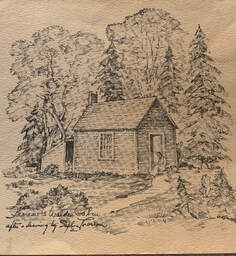|
Dr. John Getz from Xavier University is leading us on a tour of Harriet's "Literary Neighborhood"--authors and work that interacted with her own life and work, even though they were often geographically far apart. CLICK HERE for the full series.  Henry David Thoreau—truly a 19th century expert on physical distancing! In his masterpiece, Walden: Or, Life in the Woods (1845), he narrates his two-year experiment in simple living in the cabin he built on the shore of Walden Pond, near his native Concord, MA. Walden condenses Thoreau’s two years at the pond into one cycle of the seasons, thus showing his deep connection with ever-changing, always-alive nature. Thoreau wasn’t a misanthrope, but he was quirky and strongly individualistic. In the chapter “Visitors,” he celebrates (somewhat tongue-in-cheek) the power of physical distancing to enhance deep discussion and thought: “One inconvenience I sometimes experienced in so small a house, the difficulty of getting to a sufficient distance from my guest when we began to utter the big thoughts in big words. . . . As the conversation began to assume a loftier and grander tone, we gradually shoved our chairs farther apart till they touched the wall in opposite corners, and then commonly there was not room enough.” It’s unlikely that Harriet Beecher Stowe read Walden, which wasn’t popular in its day. It’s even more unlikely that Thoreau read Uncle Tom’s Cabin, since he didn’t read modern novels. But in his journal Thoreau wrote that he owned a figurine of Uncle Tom and Little Eva, the gift of a freedom seeker he helped escape. Harriet and Henry were both New Englanders, but he didn’t benefit from 18 years in Cincinnati as she did. Nevertheless, they shared a hatred of slavery, an interest in civil disobedience, and a willingness to help freedom seekers on their way north. For a free download of Walden, go to www.gutenberg.org/walden Walden can be a challenging read. Please take a few minutes to share your experience, positive or negative, with some or even part of this book. Let us know what comes to your mind when someone mentions Henry David Thoreau. Does Thoreau deserve his reputation as a progenitor of the modern environmental movement? We welcome your questions and observations about Walden or its author. About the author: Dr. John Getz, Professor Emeritus, Xavier University, retired in 2017 after teaching English there for 45 years. He specializes in American literature, especially nineteenth century, as well as the intersections of literature and peace studies. He has written articles on a variety of authors including Edith Wharton, Sherwood Anderson, and Ursula Le Guin. He appears in the documentary film Becoming Harriet Beecher Stowe, scheduled for release in spring 2020 by Fourth Wall Films.
0 Comments
Leave a Reply. |
Archives
March 2025
Categories
All
|
|

 RSS Feed
RSS Feed